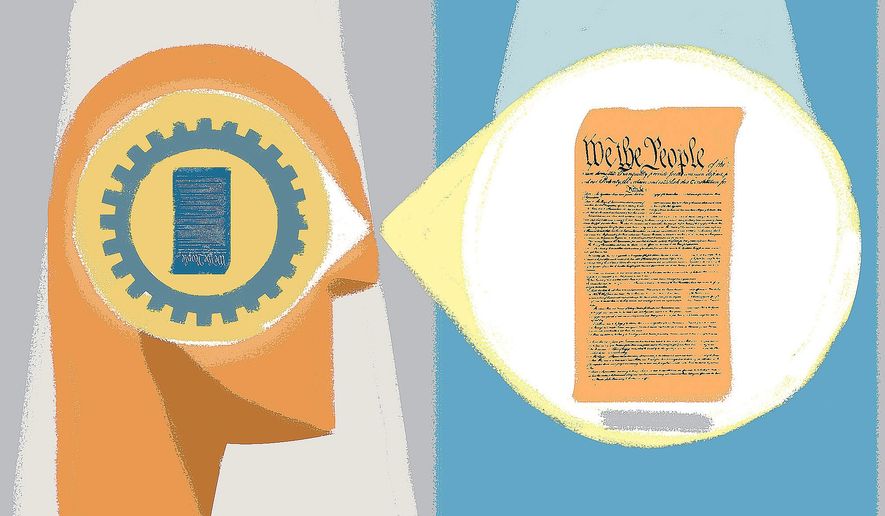OPINION:
Remember when the American Civil Liberties Union was a staunch defender of First Amendment rights? The ACLU even defended the right of American Nazis to march in Skokie, Ill., the home of thousands of Holocaust survivors. Well, nowadays the ACLU is but a shadow of its former self, as it increasingly succumbs to the left’s latest siren songs.
Here’s a case in point. In a report issued last month titled “The Public Internet Option: How Local Governments Can Provide Network Neutrality, Privacy, and Access for All,” the ACLU calls on cities to build and operate their own broadband networks.
The ACLU claims these government networks will give more people access to the Internet and promote “net neutrality” policies the ACLU favors. Both are questionable claims on the merits.
But then the ACLU goes even further, suggesting that First Amendment rights may be violated unless municipal governments operate their own communications networks:
“Fair access to high-quality Internet is a constitutional issue because such access is essential to our ability to access and share information, which in turn enables us to shape our political, civic, and social systems. As the internet becomes ever more central to our lives, individuals’ ability to exercise their First Amendment rights depends increasingly on access to online platforms. Unequal online access therefore means unequal power to exercise First Amendment rights.”
Making Internet access available to more people is a worthy goal. The principle of promoting “universal service” has been central to federal communications policy for many decades, and Ajit Pai, the chairman of the Federal Communications Commission, has made closing remaining “digital divides” a top priority.
Even so, suggesting that individuals have a First Amendment right to “equal access” to the Internet that must be vindicated by government-run networks committed to net neutrality is just wrong.
The First Amendment’s language is plain: “Congress shall make no law abridging the freedom of speech.” Thus, the Constitution restricts the government — now interpreted to mean government at all levels — from infringing speech. It does not, however, require governments to operate communications platforms in attempts to ensure against “unequal online access.”
The ACLU should know better. But now that the Trump administration’s Federal Communications Commission has repealed the Obama administration’s public utility-like net neutrality restrictions applicable to private Internet service providers, the ACLU is playing fast and loose with the traditional understanding of the First Amendment. So loose that it is happy to advocate for government-controlled communications networks.
The ACLU professes to be concerned that absent municipal government-run systems, subscribers will not be protected against abuses that are inconsistent with “net neutrality” restrictions. These generally preclude the Internet service provider from “blocking” or “throttling” Internet services based on content and charging for priority access.
But it is generally agreed that except for a very few isolated and quickly remedied incidents, private sector Internet service providers have not blocked, impaired or otherwise restricted subscriber access.
Indeed, the ACLU report identifies only three examples that it claims show private providers allegedly failed to respect net neutrality-like free speech rights — and one of those was by a Canadian company in Canada.
Here’s a fundamental point the ACLU completely ignores. While there are few examples of private Internet providers interfering with subscriber content, the track record of government-run networks with regard to protection of First Amendment rights is troubling.
Enrique Armijo, an Elon University law professor, has shown that existing municipal government-run broadband networks in New York City, Chattanooga and Wilson, N.C., as well as others, require subscribers to agree to terms of service that ban speech that the government systems consider “excessive,” “derogatory,” “abusive, or “hateful.”
These obviously are content-based speech restrictions which a government may not impose absent a compelling government interest. Although a government-run system may find it appealing for various reasons to police its network to rid it of speech it considers “abusive” or “derogatory” or the like, as Mr. Armijo has explained, such speech restrictions likely contravene the First Amendment.
The ACLU does admit in its report that the First Amendment prevents “the government from targeting certain ideas or viewpoints for censorship or reduced access.” Thus, it says that municipalities running networks “must ensure that their systems offer equal, uncensored access to the full range of lawful digital content.”
It is a great irony, isn’t it, that in light of its long — and at least until fairly recently — rather consistent history of protecting First Amendment free speech rights against government infringement, the ACLU now advocates government ownership and operation of communications networks as a means of protecting free speech?
The ACLU should know, better than most, that throughout history governments have sought to control speech to advance their own ends. And it should know that existing municipal government networks presently purport to restrict speech they find offensive or derogatory, even though such speech is constitutionally protected.
Most of all the ACLU should know that the Founders’ adopted the First Amendment to protect citizens from having their speech censored by governments — not to empower governments to be the arbiter of what speech is permissible, even under the beguiling guise of net neutrality.
• Randolph May is president of the Free State Foundation, where Theodore Bolema is a senior fellow.




Please read our comment policy before commenting.